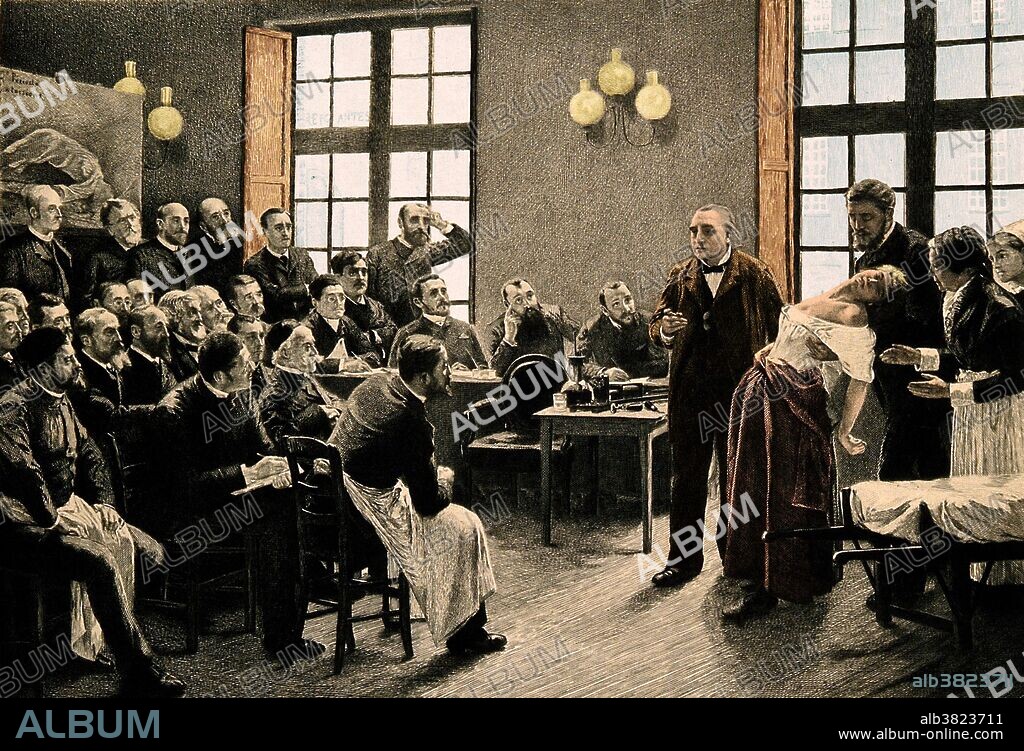alb3823711
Charcot Demonstrating Hysterical Case, 1887

|
Añadir a otro lightbox |
|
Añadir a otro lightbox |



¿Ya tienes cuenta? Iniciar sesión
¿No tienes cuenta? Regístrate
Compra esta imagen

Título:
Charcot Demonstrating Hysterical Case, 1887
Descripción:
Traducción automática: Charcot muestra un caso de histeria en la Salpètrière. Grabado basado en un óleo de Pierre-André Brouillet, 1887. Jean-Martin Charcot (1825-1893) fue un neurólogo francés al que se ha llamado "el padre de la neurología francesa". Creía que la histeria era el resultado de un sistema neurológico débil que era hereditario. Podía desencadenarse por un acontecimiento traumático como un accidente, pero en ese caso era progresiva e irreversible. Para estudiar a los histéricos bajo su cuidado, aprendió la técnica de la hipnosis y pronto se convirtió en un maestro de la relativamente nueva "ciencia". Charcot creía que un estado hipnotizado era muy similar a un ataque de histeria, por lo que hipnotizaba a sus pacientes para inducir y estudiar sus síntomas.
Charcot demonstrating a hysterical case at la Salpetriere. Engraving based on an oil painting by Pierre-André Brouillet, 1887. Jean-Martin Charcot (1825-1893) was a French neurologist who has been called "the father of French neurology." He believed that hysteria was the result of a weak neurological system which was hereditary. It could be set off by a traumatic event like an accident, but was then progressive and irreversible. To study the hysterics under his care, he learned the technique of hypnosis and soon became a master of the relatively new "science." Charcot believed that a hypnotized state was very similar to a bout of hysteria, and so he hypnotized his patients in order to induce and study their symptoms.
Crédito:
Album / Science Source
Autorizaciones:
Modelo: No - Propiedad: No
¿Preguntas relacionadas con los derechos?
¿Preguntas relacionadas con los derechos?
Tamaño imagen:
3690 x 2517 px | 26.6 MB
Tamaño impresión:
31.2 x 21.3 cm | 12.3 x 8.4 in (300 dpi)
Palabras clave:
1800S • ARTE • CIENCIA • COLOR • COLOREADA • DIBUJO • ENFERMEDAD • EUROPEA • EUROPEO • FAMOSA • FAMOSO • FIGURA • FRANCES • GENTE • GRABADO • HIPNOSIS • HISTERIA • HISTERICA • HISTORIA • HISTORICO • HOMBRE • HOMBRES • ILUSTRACION • IMPORTANTE • MASCULINO • MAYOR • MEDICINA • MEDICINAL • MEJORA • MEJORAR • MUJER • NEUROLOGIA • NEUROLOGO • OBRA DE ARTE • PACIENTE • PERSONA • PERSONALIDAD • PERSONALIDADES • RETRATO DE HOMBRE • SIGLO XIX
 Pinterest
Pinterest Twitter
Twitter Facebook
Facebook Copiar enlace
Copiar enlace Email
Email
